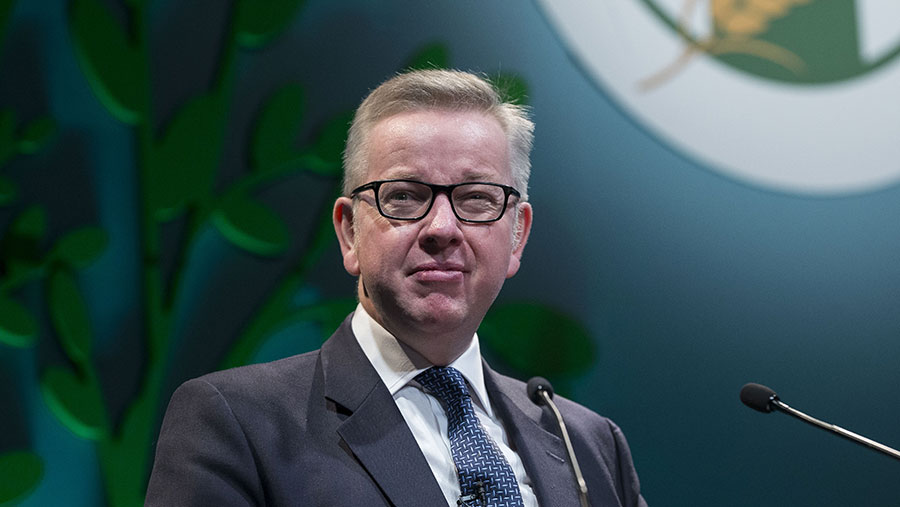Gove’s farm Brexit plan inadequate, warn industry leaders
 Michael Gove © David Hartley/REX/Shutterstock
Michael Gove © David Hartley/REX/Shutterstock Defra plans to phase out direct payments across England lack enough detail for farmers to restructure their businesses to cope without them, say industry leaders.
Direct payments will be abolished within a decade – and possibly as soon as five years – after the UK leaves the European Union next year, according to plans contained in a government consultation published on Tuesday (27 February).
See also: Gove plans to redirect farm payments to environment
Defra secretary Michael Gove said the money saved would be redirected into a new system of paying farmers “public money for public goods” – principally work to enhance the environment and invest in sustainable food production.
Reducing direct payments could free up £150m for the environment and other public goods in the first year alone under a 10-year transition to the new system – rising to as much as £276m in the first year under a five-year transition, suggests the consultation.
Environment scheme
But while the document contains detailed proposals to phase out direct payments – starting with larger farmers first, there is less information about what will replace them. The paper contains little more than a list of ideas, including plans for an environmental land management scheme.
The range of public goods that could qualify for government funding, includes higher animal welfare standards, wildlife protection, public access and new technology. But the document is less forthcoming on measures to mitigate volatile farm prices, for example.
NFU president Minette Batters said: “It is vital that we don’t start overhauling parts of the current system which support farmers in providing a healthy and affordable supply of food, without tested and operational alternative programmes and measures in place.”
‘No answers’
Country Land and Business Association president Tim Breitmeyer said certainty was vital if farmers were to increase productivity, profitability and environmental protection. “That is what we were promised and instead we have open questions, few decisions and no answers.”
Mr Gove said: “The proposals in this paper set out a range of possible paths to a brighter future for farming. They are the beginning of a conversation, not a conclusion and we want everyone who cares about the food we eat and the environment around us to contribute.”
Farm payments in 2019 will follow the existing model and the government has pledged the same amount of money for the sector overall until 2022. It has also pledged to simplify applications for farmers wishing to enter into existing schemes that provide environmental benefits.
Mr Gove has previously said that post-Brexit support for farmers in Scotland and Wales is a matter for the devolved administrations in Holyrood and Cardiff. The consultation for England will run for 10 weeks, closing on 8 May 2018.
Industry reaction
“Vague principles and romanticising about the British countryside will not reduce the alarming rise in food banks, tackle growing food insecurity, or give farmers the stability they need.”
Labour shadow Defra secretary Sue Hayman
“Sustainable food production must be at the heart of our new agricultural policy. UK manufacturers rely upon our farmers to provide them with a reliable source of raw materials and ingredients.”
Food and Drink Federation director general Ian Wright
“Defra’s consultation is a mixture of vision and pragmatism to please many and probably annoy farmers. Inevitably, it does not promise a budget to deliver what we know is needed.”
Sustain campaign co-ordinator Vicki Hird
“There is much to welcome in this paper’s ambition for high standards of food quality and farm animal welfare, for improving soil health, tackling climate change and protecting the environment.”
Soil Association chief executive Helen Browning
“Animal health and welfare underpin the reputation of UK agricultural produce, so it is essential that these are supported as public goods in agricultural policy post-Brexit.”
British Veterinary Association president John Fishwick
